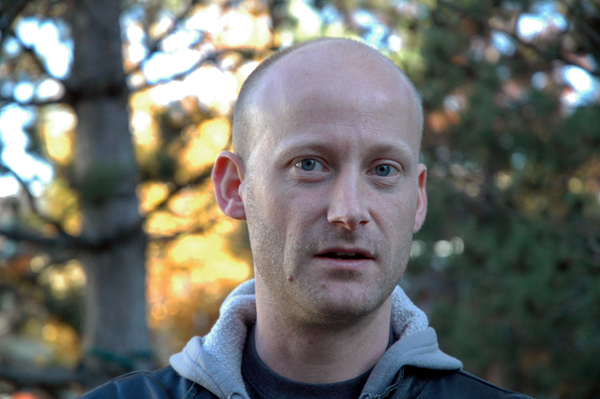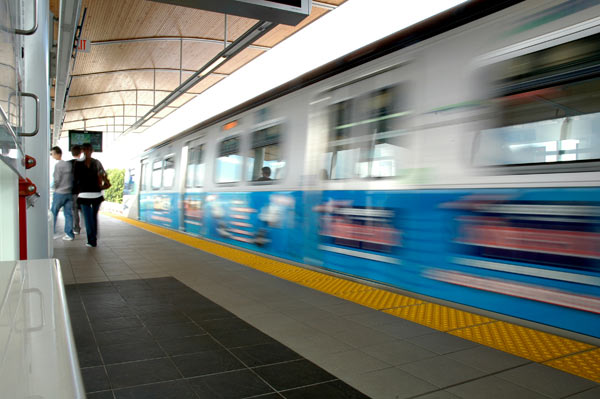Negotiations over, U-Pass program to go to vote
November 6, 2010 by Jeff Groat · 1 Comment

KSA director of external affairs, Matt Todd, is concerned that students will need to wait even longer for a U-Pass. Todd hopes the U-Pass referendum will be held in February. Photo By Jeff Groat
A week ago, the Kwantlen Student Association postponed a referendum on the U-Pass as negotiations hadn’t reached a conclusion before a target date set by TransLink set. This week, the negotiations were finalized, pending working out details in a couple areas.
The result is a recommendation that students vote in February 2011 to accept or reject a U-Pass.
One area that still needs to be worked out is the wording of the contract to include Adult Basic Education (ABE) students in the U-Pass program. ABE students are mature students who did not graduate from high school but are upgrading some education to continue in university education. Originally, these students were not included in the U-Pass program, since ABE credits do not count as regular full-time credits like most other courses do.
Another, more finicky area, concerns students who withdraw from courses after they receive a U-Pass.
Hypothetically, it may be possible for a student to register for one class, receive a U-Pass, then withdraw from that class. In this case, TransLink would charge Kwantlen an additional $50 to make up the difference between a U-Pass and a regular one-zone buss pass, as this person would no longer be considered a student at Kwantlen.
The problem lies in the fact that Kwantlen does not have the means to collect this fee from the student, and is wrestling with the question of whether a student can be prevented from registering for classes before paying back the institution.
Matt Todd, the Kwantlen Student Administration’s director of external affairs, said, “the university has this dilemma of would we really prevent somebody from furthering their post secondary education because they didn’t pay for their U-Pass?”
At the table, Kwantlen failed to negotiate an increase in the exemption limits from one to five per cent, something that Kwanten believes is a problem unique to the Fraser Valley.
“Because most of those students [in the valley] go to Kwantlen, we feel that this is a problem that is special to Kwantlen,“ Todd said.
The student association expects roughly five per cent of students will want to be exempt from paying for and using their U-Pass, because of a lack of reliable and frequent transit access in some communities of the valley. These students would be forced to pay for a U-Pass that they are likely to not use.
“We don’t think that’s fair to students,” Todd said.
According to Todd, there are two options: “Better service or exempt those students.”
If approved, the U-Pass system will be a two-card system for at least two years or until TransLink implements a smart-card electronic fare system.
This means the KSA will incur the costs of redesigning new student ID cards that include some features required by TransLink, as well as the U-Pass card itself. There are other expenses for implementing the U-Pass, such as hiring staff to deal with the new program, training staff and buying new software. All these costs are paid by participating schools and only an increase in student fees would pay for this.
“They have come to the table, they’ve made a big investment, but I don’t think [the province] realized how much it was going to cost,” Todd said.
Todd is recommending that the referendum be held in the first week of February next year.
U-Pass for Kwantlen appears easier said than done
September 19, 2010 by Jeff Groat · Leave a Comment

Unlike students at Surrey and Langley campuses, students at Richmond campus already have fast transit access with the Canada Line stopping at Lansdowne station. (Photo by Jeff Groat)
The B.C. government has granted smaller universities access to the U-Pass program, but for students at Kwantlen, implementation is easier said than done.
The U-Pass is a subsidized bus pass program, allowing holders multi-zone access to Metro Vancouver’s bus and SkyTrain system.
For larger universities, like UBC and SFU, who are served well by Translink, Kwantlen’s campuses in the suburbs are faced with challenges that may affect how many people would actually find such a pass useful.
“This is a real challenge for, in particular, Surrey, Langley and Cloverdale students,” said Jody Gordon, Associate Vice President, Students at Kwantlen.
“[TransLink say[s] there’s no money to put on the table for service improvements, unlike past U-Pass programs,” she said.
Gordon cited UBC negotiating for extra B-line service as something that Kwantlen won’t see. This means a traditional U-Pass for Kwantlen that is merely a cheap bus pass doesn’t have the same value as it would at other universities.
According to Matt Todd, KSA Director of External Affairs, a typical bus pass needs to be coupled with a variety of other services in order to make it appealing to students who now drive to school, a number that is quite large at Kwantlen.
“There isn’t very good transit in some neighbourhoods, in what we call the south-of-Fraser region,” Todd said.
“Langley, Surrey, Delta, those communities don’t have the quality of service that other cities in the Metro Vancouver area have.
“This is a challenge for Kwantlen students, because some of them, public transit is not a reasonable option for them.”
A more direct challenge facing Kwantlen is increasing the transit service between campuses by creating an express Kwantlen route between Richmond, Surrey and Langley campuses. Such an option would need to be financed by Kwantlen at the outsest, according to Todd.
Based on what it sees as the transit shortfalls, the KSA wants to move beyond the U-Pass into what it’s calling a multipass, marrying the normal transit pass with other services that students may want.
“The U-Pass is about healthier living and sustainable living,” Todd said, citing a reason to opt for including such items as a discounted gym membership in the pass.
“Of course, not everybody is going to want to be a Gold’s Gym member, so what else can we do?” Todd asked.
Another option would be to offer students who drive a discount on parking passes, making sure everyone has something they could take advantage of with a Kwantlen-style U-Pass.
Gordon said that identifying which students would qualify for a multipass would not be easy. As some programs do not run on a regular semester-based system, some students who would find a use for the pass could go without one under the current definition.
The total cost of a multipass, with all of its extra services, would come in at about $40 according to the KSA, and would likely not be available until fall 2011, although it may be available as early as summer semester next year.
• • •
U-Pass: A timeline
Amanda Punshon takes a look back at the history of the popular low-cost transit pass: click on each of the “bus stop” years to see how it has all unfolded.
Opinion: U-Pass plan bigger than saving bucks
December 16, 2009 by Sarah Jackson · 2 Comments
The Kwantlen Student Association’s plan to introduce a U-Pass by September 2010 looks like a win-win for Kwantlen students.
The KSA, in conjunction with the Ministry of Transportation and Translink, hopes to have the green light on a U-Pass plan, which is still being formed, in time for a standalone referendum in April.
“I really do feel that this is possible,†said Derek Robertson, director of external affairs for the KSA.
Transit ridership among Kwantlen students is estimated to be at only about 20 to 25 per cent. That leaves a jaw-dropping majority of students who, at first glance, will be paying for a service that they won’t use. And at an open-for-discussion $20-a-month objective, that’s a lot of money that three-quarters of the student population will be paying so the others can get cheaper transit.
What good is a U-Pass to us, the drivers, bicyclers and students who are dropped off?
I contacted Translink and the Ministry of Transportation to get answers. Sappy answers.
“Some students who said they wouldn’t use it do end up using it,†said Ken Hardie, director of communications at Translink. He also argued the merits of having a pre-paid ride home after drunken parties.
He even said “Translink itself does not have plans to expand the U-Pass program,†because it was not organized in a manner that would allow widespread implementation. Rather, it is taking its cue from the Ministry of Transportation, where government officials are aiming to fulfill a campaign promise of a universal U-Pass by next September.
More parking spaces, lower fuel emissions and less traffic was the best that Linda Gold, spokesperson for the Ministry of Transportation, could come up with.
Luckily, the KSA has their act together.
“We cannot put a U-Pass to the students that benefits some but harms others,†said Robertson. The KSA will spend the next few months compiling results from this fall’s U-Pass consultations and surveys to draft a proposal that will be discussed in meetings with the minister of transportation, Translink, local MPs and local MLAs.
The meetings will focus on “nonnegotiable” requirements for improvement to transit service before tentative agreements will be made. Robertson is planning to ask for improvements to transit service, which may involve requests for an increase in transit frequency and better campus, Skytrain and major urban centre connections.
He’ll also focus on adding extra services, including bike racks on transit, bike lockers on campus and regular on-campus bike clinics. Although there won’t be any opt-out for students, a carpool discount may be introduced with the condition that drivers be added to a registry that other students can use to discover local carpool pals.
Odds are good that Kwantlen will be receiving a U-Pass on the low end of the scale for colleges and universities in the U-Pass program, because the low ridership is subsidized by the greater student population. Currently, Translink charges students at the University of British Columbia $25 a month, the lowest price for any U-Pass in B.C., because of the school’s low ridership at the time the program was initiated. At present, the KSA is leaning towards implementing the U-Pass for both full-time and part-time students, which they hope will help more part-time students to transition to full-time status.
Earlier this year, the KSA declined participation in OnePassNow talks, which pushed for a $25 U-Pass for all Metro Vancouver students, because the transit-improvement needs for Kwantlen students were greater than the needs of the student unions represented. Robertson feared that Emily Carr and Vancouver Community College would not act on Kwantlen’s behalf to request transit improvements, and said that Kwantlen students would be paying for lower service than other participating colleges would receive.
“They have arguably the best transit in the province,†he said. “They are not seeking transit upgrades.â€
Robertson also explained that the age-old offer of a $19 U-Pass for Kwantlen students was turned down because there would not have been any transit upgrades, which rendered it useless to the better half of the student population.
The KSA wants the province introduce a U-Pass levied at different rates according to school ridership to make it revenue-neutral for Translink, as is currently done, but with a universal provincial subsidy to keep the price down.
The requirement for transit improvements is a good one. I’d gladly pay an extra $80 or so each semester for a shorter ride to campus. But there’s a lot of work to be done before transit service south of the Fraser River is worth a dime or two. The KSA doesn’t have much time to move that mountain before its plan for a U-Pass vote by April passes Kwantlen students by — again.


